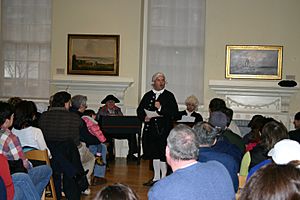Samuel Miller Quincy facts for kids
Quick facts for kids
Samuel Miller Quincy
|
|
|---|---|
| 28th Mayor of New Orleans | |
| In office May 5, 1865 – June 8, 1865 |
|
| Preceded by | Hugh Kennedy |
| Succeeded by | Glendy Burke |
| Personal details | |
| Born | 1832 |
| Died | March 24, 1887 (aged 54–55) |
| Alma mater | Harvard University |
| Occupation | Lawyer |
| Military service | |
| Allegiance | United States Union |
| Branch/service | Army |
| Rank | |
| Commands | 2nd Massachusetts Infantry Regiment 73rd U.S. Colored Infantry Regiment 96th U.S. Colored Infantry Regiment 81st U.S. Colored Infantry Regoment |
| Battles/wars | American Civil War |
Samuel Miller Quincy (1832–1887) was an important figure in American history. He served as the 28th mayor of New Orleans. He was also a brave officer in the Union Army during the American Civil War.
Contents
Who Was Samuel Miller Quincy?
Samuel Miller Quincy was born in 1832. He came from a famous family. His father, Josiah Quincy, Jr., was once the mayor of Boston. Samuel was also the younger brother of Josiah Phillips Quincy.
Early Life and Family
His family had deep roots in American history. He was a distant cousin of President John Quincy Adams. He was also a descendant of Rev. George Phillips. George Phillips settled in Watertown, Massachusetts, way back in 1630.
Samuel went to Harvard University and graduated in 1852. After college, he became a lawyer. He also studied legal history.
A Brave Soldier in the Civil War
When the American Civil War began, Samuel Miller Quincy joined the Union Army. He fought for the United States. During his time as a soldier, he faced many challenges. He was wounded in battle. He was also captured by the enemy and held as a prisoner. Later, he was exchanged for other prisoners.
Joining the Army
Soon after the attack on Fort Sumter, Samuel became a captain. This was on May 25, 1861, in the 2nd Regiment Massachusetts Volunteer Infantry. He quickly rose through the ranks. He became a major on October 22, 1862. Then, he was promoted to colonel on January 18, 1863.
He left his first commission on June 5, 1863. But he soon rejoined the army. On November 29, 1863, he became a lieutenant colonel. He served with the 73rd United States Colored Infantry Regiment. He was promoted to colonel of this regiment on May 29, 1864.
Leading Troops and Challenges
After the war ended, he continued his military service. On September 27, 1865, he moved to the 96th US Colored Infantry Regiment. He finished his service with them on January 21, 1866. The very next day, he became the colonel of the 81st US Colored Infantry. He officially left the army on November 30, 1866.
Serving as Mayor of New Orleans
While still serving in the army, Samuel Miller Quincy also took on a political role. He was the mayor of New Orleans for a short time. He served as mayor from May 5 to June 8, 1865. This was right after the Civil War ended.
Honored for His Service
For his brave and excellent service during the war, Samuel Miller Quincy received a special honor. On February 21, 1866, President Andrew Johnson nominated him. He was given the honorary rank of brevet brigadier general. This honor recognized his important contributions. The U.S. Senate confirmed this award on May 18, 1866.
Samuel Miller Quincy was also a member of the Massachusetts Commandery. This was part of the Military Order of the Loyal Legion of the United States. This group honored officers who served in the Union Army during the Civil War.
General Quincy passed away on March 24, 1887.
 | Aaron Henry |
 | T. R. M. Howard |
 | Jesse Jackson |


